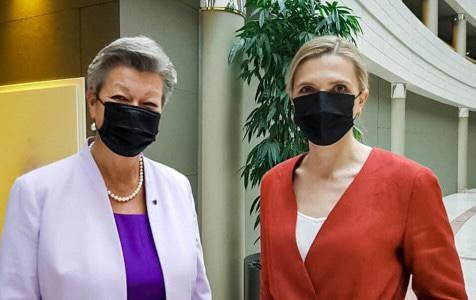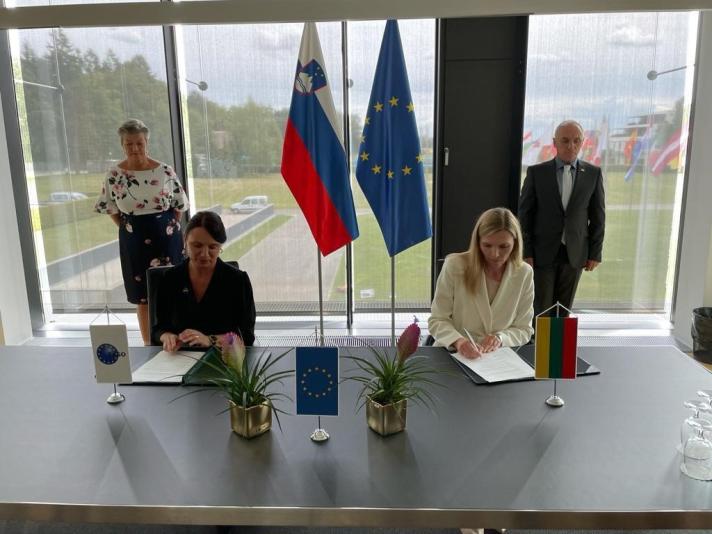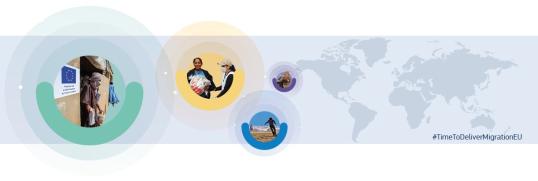Archived content
This website is no longer being updated. The content may be out-of-date and should be consulted for past reference only.
To find information about the College of Commissioners for the term 2024-2029, go to the Commission’s main website
This website is no longer being updated. The content may be out-of-date and should be consulted for past reference only.
Using desperate human beings, and people’s hope for a better life, as a political instrument is unacceptable.
The Lithuanian external border is the European Union’s external border. Lithuanian concerns are European concerns. As a Union, we are coming to Lithuania’s aid. At the same time, this challenge shows the need for further agreements on the Pact.
Normally Lithuania is off the beaten track when it comes to irregular migration. Last year, just 74 people crossed the border with Belarus. Most of them fleeing Belarus and Russia. This year so far more than 1700 people entered Lithuania – 23 times more than the year before – especially in June and July.
On Monday, I discussed the situation with the European Parliament. At the same meeting, Lithuanian Minister of the Interior Agnė Bilotaitė presented information that strongly indicated that the Belarusian regime are transferring people towards and across the border.
How exactly is still under investigation. It appears that people arrive on commercial flights to Minsk from Istanbul and Baghdad, and are then facilitated to the EU border. They attempt to cross the border on foot, often in places that are not being watched – more than 60 per cent of the 678 km long border. Then, most of them claim asylum in Lithuania – or move on. According to Europol’s assessment, irregular migrants on this route pay a fee of some 15,000 euro.
Lukashenko’s motive? Retaliation.
Lithuania supports civil society in Belarus. And the EU has taken action against the Lukashenko regime. Last year, the EU refused to recognise the results of the unfree and unfair Presidential elections in Belarus, and imposed sanctions against people responsible for violence and repression. In June, the EU imposed new sanctions following the forced landing of a Ryanair flight in Minsk.
An authoritarian regime is consciously exploiting human beings for political reasons. This is completely unacceptable.
In June the European Council condemned and rejected any attempt by third countries to instrumentalise migrants for political purposes.
Last Thursday, at an informal Council meeting in Slovenia, I told Home Affairs Ministers that the EU is ready to consider further action under the visa facilitation agreement against the regime in Belarus – action that would hurt Lukashenko’s regime, and not the people of Belarus, who will continue benefiting from the visa facilitation agreement.
The EU has also reached out to Iraq and Turkey, where many flights originate.
Above all, we must show solidarity with Lithuania. EU support for Lithuania has been immediate and comprehensive.
Frontex have started to send officers and vehicles. But now it’s time to step up these efforts. Last weekend, Lithuania asked Frontex for rapid border intervention.
Lithuania’s needs must be met immediately. That means providing 60 border guard officers, 30 patrol cars, 2 helicopters and one thermal vision vehicle – and more to protect the border.
We are also helping Lithuania to protect people and process asylum applications. People have the right to apply for asylum, and must be treated with dignity and respect.
On Thursday, together with Slovenian Minister Aleš Hojs I witnessed the signing by the executive director of the European Asylum Support Office (EASO) and the Minister of Interior of Lithuania of an agreement to deploy rapid aid. EASO will help to register and process applications for asylum and manage the reception of applicants. By the end of the year, EASO will deploy up to 50 personnel to support Lithuania.
More than 10 million euro of European funds can be made available immediately from the Asylum, Migration and Integration Fund (AMIF) to support people in need, and more will follow.
Europol is also supporting the Lithuanian authorities. Migrant smuggling is a crime.
This emergency is not over yet. And we must do more. But at the moment, this challenge makes three things clear.
First, as a Union we are showing solidarity with Lithuania. We are rallying around and helping a Member State and people in need.
Second, we must make further progress on the Pact. I am glad that several Members of the European Parliament argued that we would be in a much better situation if all elements of the Pact would be in place. On Thursday, several ministers also argued this example shows the need for further agreements on the Pact.
We can already manage our external borders better if we conclude an agreement on my screening proposal – which allows for swift checks of people involved in irregular border crossings – and on the Eurodac proposal, which modernises IT systems that keep track of unauthorised movements of people seeking asylum.
This reality should serve as a stark reminder of the urgent need, to make further progress on the Pact, step by step.
#TimetoDeliverMigrationEU is a weekly blog outlining the benefits of the proposals on migration tabled by the European Commission on 23 September 2020. For more detail on the New Pact on Migration and Asylum see below.
For More information
New Pact on Migration and Asylum | European Commission (europa.eu)
Add link to the Resettlement Recommendation: EUR-Lex - 32020H1364 - EN - EUR-Lex (europa.eu)
Commissioner Johansson’s blog: A transparent and accountable EU-wide asylum and migration system means modern digital infrastructure
Commissioner Johansson’s blog: What a full European Asylum Agency would bring to asylum and migration management
Commissioner Johansson’s blog: More legal pathways to the EU
DG Migration and Home Affairs website: Resettlement and other pathways to protection
Statistics on migration to Europe
Details
- Publication date
- 18 July 2021
- Author
- Directorate-General for Communication



